Child Development Assignment: Personal Characteristics and Theories
VerifiedAdded on 2023/01/09
|9
|2229
|45
Homework Assignment
AI Summary
This assignment delves into the psychology of child development by examining the author's personal childhood experiences between the ages of 7 and 11. The author reflects on their initial struggles in academics, sports, and overall well-being, highlighting the challenges of obesity and poor performance. The assignment then applies three key psychological theories to explain these experiences and the subsequent positive changes. Erikson's theory of psychosocial development is used to analyze the author's journey through the Industry vs. Inferiority stage, emphasizing the impact of encouragement and competence. Bandura's observational learning theory is applied to explain how the author adopted positive habits and values through observing family members. Finally, Vygotsky's sociocultural theory is used to illustrate the influence of parents and teachers, the more knowledgeable others, in fostering the author's development. The author concludes by emphasizing the importance of these theories in understanding the turning point of their life and the development of confidence and positive habits.
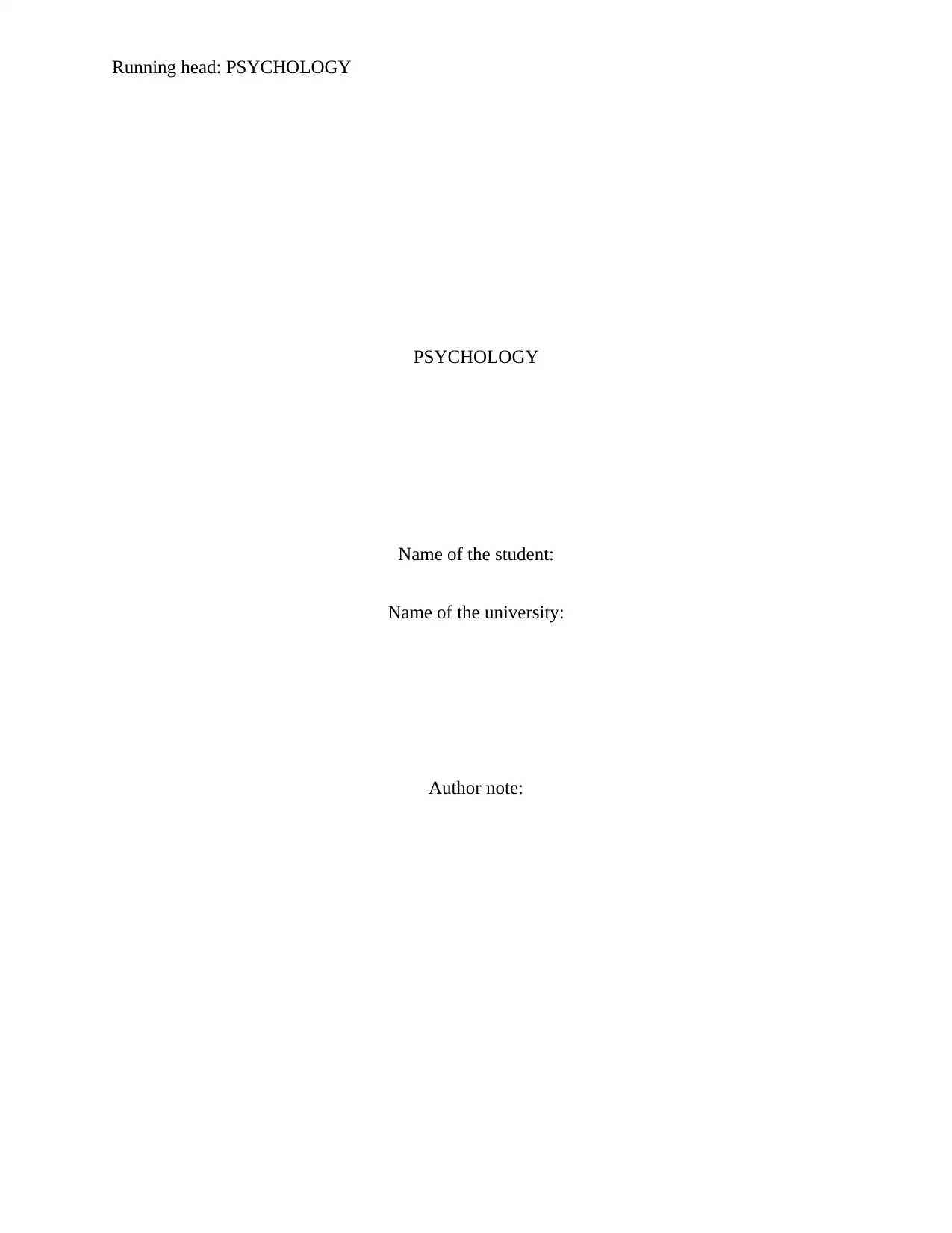
Running head: PSYCHOLOGY
PSYCHOLOGY
Name of the student:
Name of the university:
Author note:
PSYCHOLOGY
Name of the student:
Name of the university:
Author note:
Paraphrase This Document
Need a fresh take? Get an instant paraphrase of this document with our AI Paraphraser
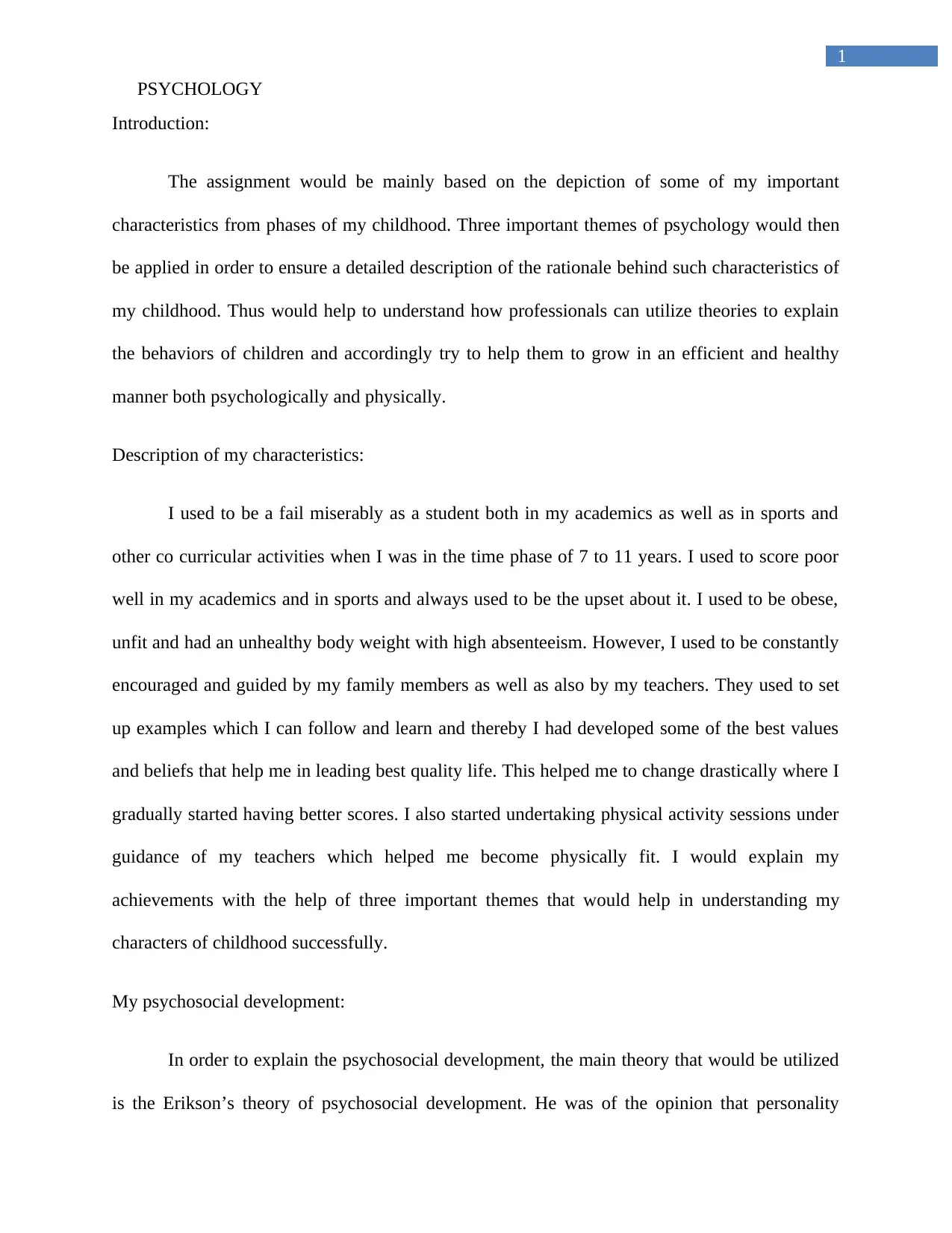
1
PSYCHOLOGY
Introduction:
The assignment would be mainly based on the depiction of some of my important
characteristics from phases of my childhood. Three important themes of psychology would then
be applied in order to ensure a detailed description of the rationale behind such characteristics of
my childhood. Thus would help to understand how professionals can utilize theories to explain
the behaviors of children and accordingly try to help them to grow in an efficient and healthy
manner both psychologically and physically.
Description of my characteristics:
I used to be a fail miserably as a student both in my academics as well as in sports and
other co curricular activities when I was in the time phase of 7 to 11 years. I used to score poor
well in my academics and in sports and always used to be the upset about it. I used to be obese,
unfit and had an unhealthy body weight with high absenteeism. However, I used to be constantly
encouraged and guided by my family members as well as also by my teachers. They used to set
up examples which I can follow and learn and thereby I had developed some of the best values
and beliefs that help me in leading best quality life. This helped me to change drastically where I
gradually started having better scores. I also started undertaking physical activity sessions under
guidance of my teachers which helped me become physically fit. I would explain my
achievements with the help of three important themes that would help in understanding my
characters of childhood successfully.
My psychosocial development:
In order to explain the psychosocial development, the main theory that would be utilized
is the Erikson’s theory of psychosocial development. He was of the opinion that personality
PSYCHOLOGY
Introduction:
The assignment would be mainly based on the depiction of some of my important
characteristics from phases of my childhood. Three important themes of psychology would then
be applied in order to ensure a detailed description of the rationale behind such characteristics of
my childhood. Thus would help to understand how professionals can utilize theories to explain
the behaviors of children and accordingly try to help them to grow in an efficient and healthy
manner both psychologically and physically.
Description of my characteristics:
I used to be a fail miserably as a student both in my academics as well as in sports and
other co curricular activities when I was in the time phase of 7 to 11 years. I used to score poor
well in my academics and in sports and always used to be the upset about it. I used to be obese,
unfit and had an unhealthy body weight with high absenteeism. However, I used to be constantly
encouraged and guided by my family members as well as also by my teachers. They used to set
up examples which I can follow and learn and thereby I had developed some of the best values
and beliefs that help me in leading best quality life. This helped me to change drastically where I
gradually started having better scores. I also started undertaking physical activity sessions under
guidance of my teachers which helped me become physically fit. I would explain my
achievements with the help of three important themes that would help in understanding my
characters of childhood successfully.
My psychosocial development:
In order to explain the psychosocial development, the main theory that would be utilized
is the Erikson’s theory of psychosocial development. He was of the opinion that personality
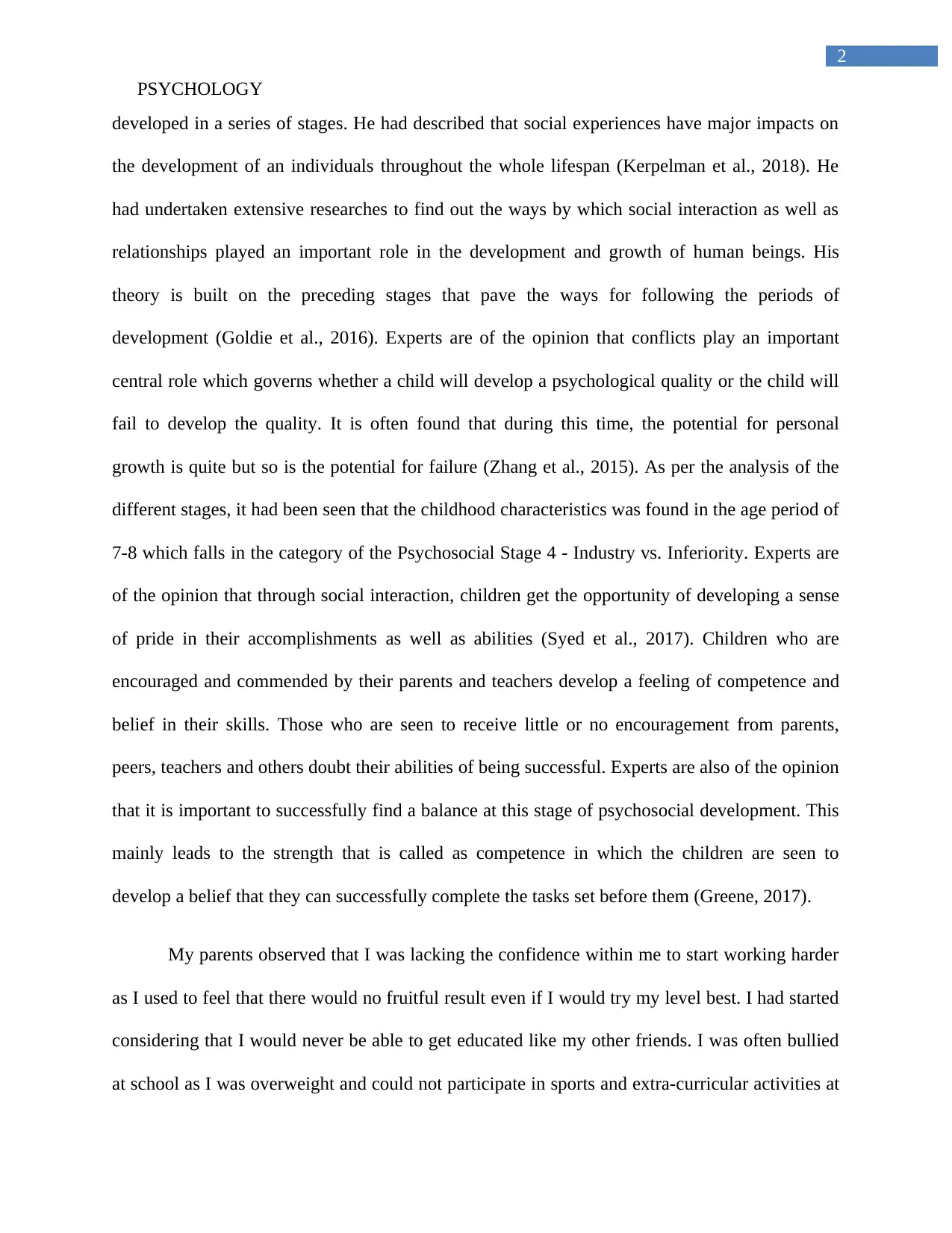
2
PSYCHOLOGY
developed in a series of stages. He had described that social experiences have major impacts on
the development of an individuals throughout the whole lifespan (Kerpelman et al., 2018). He
had undertaken extensive researches to find out the ways by which social interaction as well as
relationships played an important role in the development and growth of human beings. His
theory is built on the preceding stages that pave the ways for following the periods of
development (Goldie et al., 2016). Experts are of the opinion that conflicts play an important
central role which governs whether a child will develop a psychological quality or the child will
fail to develop the quality. It is often found that during this time, the potential for personal
growth is quite but so is the potential for failure (Zhang et al., 2015). As per the analysis of the
different stages, it had been seen that the childhood characteristics was found in the age period of
7-8 which falls in the category of the Psychosocial Stage 4 - Industry vs. Inferiority. Experts are
of the opinion that through social interaction, children get the opportunity of developing a sense
of pride in their accomplishments as well as abilities (Syed et al., 2017). Children who are
encouraged and commended by their parents and teachers develop a feeling of competence and
belief in their skills. Those who are seen to receive little or no encouragement from parents,
peers, teachers and others doubt their abilities of being successful. Experts are also of the opinion
that it is important to successfully find a balance at this stage of psychosocial development. This
mainly leads to the strength that is called as competence in which the children are seen to
develop a belief that they can successfully complete the tasks set before them (Greene, 2017).
My parents observed that I was lacking the confidence within me to start working harder
as I used to feel that there would no fruitful result even if I would try my level best. I had started
considering that I would never be able to get educated like my other friends. I was often bullied
at school as I was overweight and could not participate in sports and extra-curricular activities at
PSYCHOLOGY
developed in a series of stages. He had described that social experiences have major impacts on
the development of an individuals throughout the whole lifespan (Kerpelman et al., 2018). He
had undertaken extensive researches to find out the ways by which social interaction as well as
relationships played an important role in the development and growth of human beings. His
theory is built on the preceding stages that pave the ways for following the periods of
development (Goldie et al., 2016). Experts are of the opinion that conflicts play an important
central role which governs whether a child will develop a psychological quality or the child will
fail to develop the quality. It is often found that during this time, the potential for personal
growth is quite but so is the potential for failure (Zhang et al., 2015). As per the analysis of the
different stages, it had been seen that the childhood characteristics was found in the age period of
7-8 which falls in the category of the Psychosocial Stage 4 - Industry vs. Inferiority. Experts are
of the opinion that through social interaction, children get the opportunity of developing a sense
of pride in their accomplishments as well as abilities (Syed et al., 2017). Children who are
encouraged and commended by their parents and teachers develop a feeling of competence and
belief in their skills. Those who are seen to receive little or no encouragement from parents,
peers, teachers and others doubt their abilities of being successful. Experts are also of the opinion
that it is important to successfully find a balance at this stage of psychosocial development. This
mainly leads to the strength that is called as competence in which the children are seen to
develop a belief that they can successfully complete the tasks set before them (Greene, 2017).
My parents observed that I was lacking the confidence within me to start working harder
as I used to feel that there would no fruitful result even if I would try my level best. I had started
considering that I would never be able to get educated like my other friends. I was often bullied
at school as I was overweight and could not participate in sports and extra-curricular activities at
⊘ This is a preview!⊘
Do you want full access?
Subscribe today to unlock all pages.

Trusted by 1+ million students worldwide
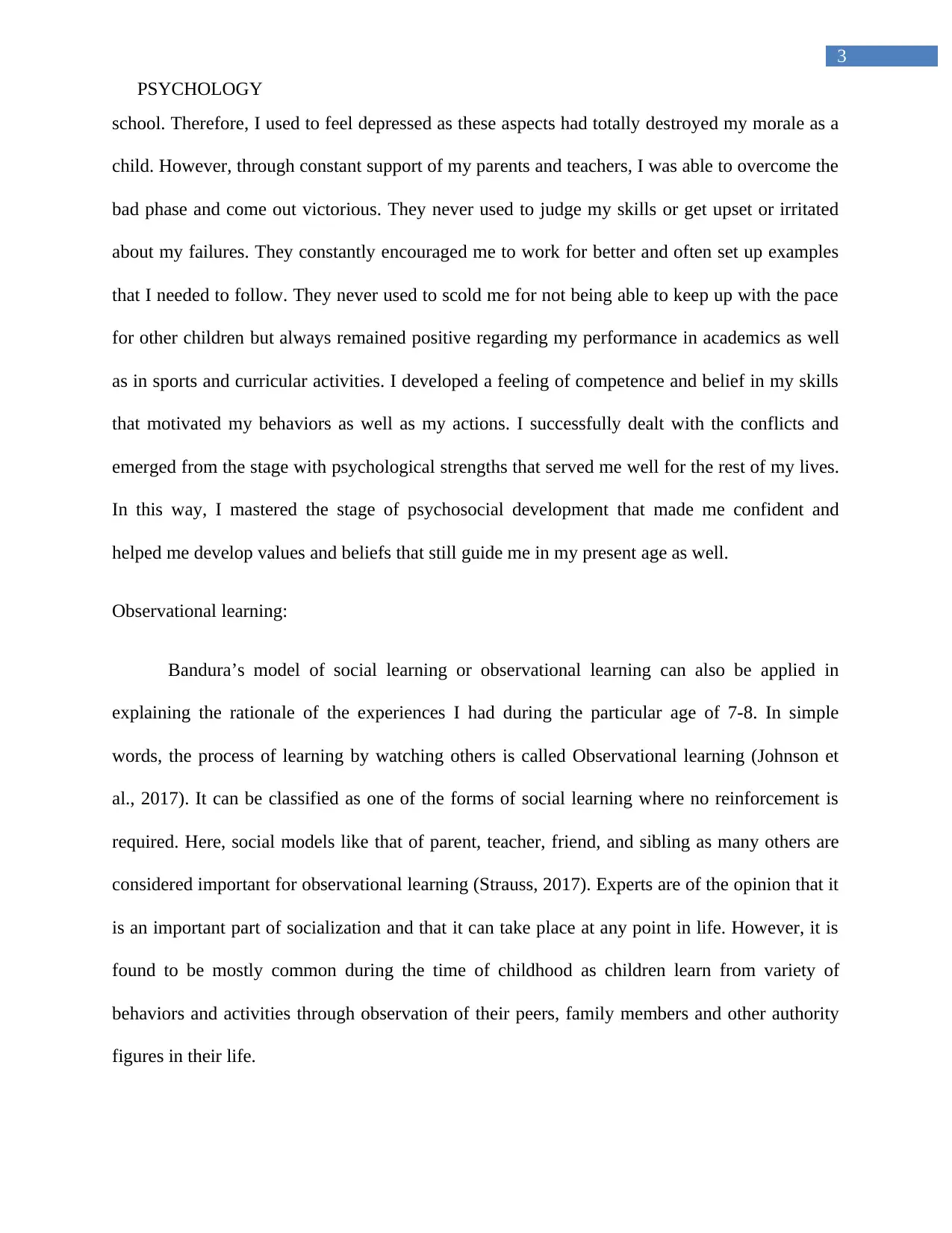
3
PSYCHOLOGY
school. Therefore, I used to feel depressed as these aspects had totally destroyed my morale as a
child. However, through constant support of my parents and teachers, I was able to overcome the
bad phase and come out victorious. They never used to judge my skills or get upset or irritated
about my failures. They constantly encouraged me to work for better and often set up examples
that I needed to follow. They never used to scold me for not being able to keep up with the pace
for other children but always remained positive regarding my performance in academics as well
as in sports and curricular activities. I developed a feeling of competence and belief in my skills
that motivated my behaviors as well as my actions. I successfully dealt with the conflicts and
emerged from the stage with psychological strengths that served me well for the rest of my lives.
In this way, I mastered the stage of psychosocial development that made me confident and
helped me develop values and beliefs that still guide me in my present age as well.
Observational learning:
Bandura’s model of social learning or observational learning can also be applied in
explaining the rationale of the experiences I had during the particular age of 7-8. In simple
words, the process of learning by watching others is called Observational learning (Johnson et
al., 2017). It can be classified as one of the forms of social learning where no reinforcement is
required. Here, social models like that of parent, teacher, friend, and sibling as many others are
considered important for observational learning (Strauss, 2017). Experts are of the opinion that it
is an important part of socialization and that it can take place at any point in life. However, it is
found to be mostly common during the time of childhood as children learn from variety of
behaviors and activities through observation of their peers, family members and other authority
figures in their life.
PSYCHOLOGY
school. Therefore, I used to feel depressed as these aspects had totally destroyed my morale as a
child. However, through constant support of my parents and teachers, I was able to overcome the
bad phase and come out victorious. They never used to judge my skills or get upset or irritated
about my failures. They constantly encouraged me to work for better and often set up examples
that I needed to follow. They never used to scold me for not being able to keep up with the pace
for other children but always remained positive regarding my performance in academics as well
as in sports and curricular activities. I developed a feeling of competence and belief in my skills
that motivated my behaviors as well as my actions. I successfully dealt with the conflicts and
emerged from the stage with psychological strengths that served me well for the rest of my lives.
In this way, I mastered the stage of psychosocial development that made me confident and
helped me develop values and beliefs that still guide me in my present age as well.
Observational learning:
Bandura’s model of social learning or observational learning can also be applied in
explaining the rationale of the experiences I had during the particular age of 7-8. In simple
words, the process of learning by watching others is called Observational learning (Johnson et
al., 2017). It can be classified as one of the forms of social learning where no reinforcement is
required. Here, social models like that of parent, teacher, friend, and sibling as many others are
considered important for observational learning (Strauss, 2017). Experts are of the opinion that it
is an important part of socialization and that it can take place at any point in life. However, it is
found to be mostly common during the time of childhood as children learn from variety of
behaviors and activities through observation of their peers, family members and other authority
figures in their life.
Paraphrase This Document
Need a fresh take? Get an instant paraphrase of this document with our AI Paraphraser
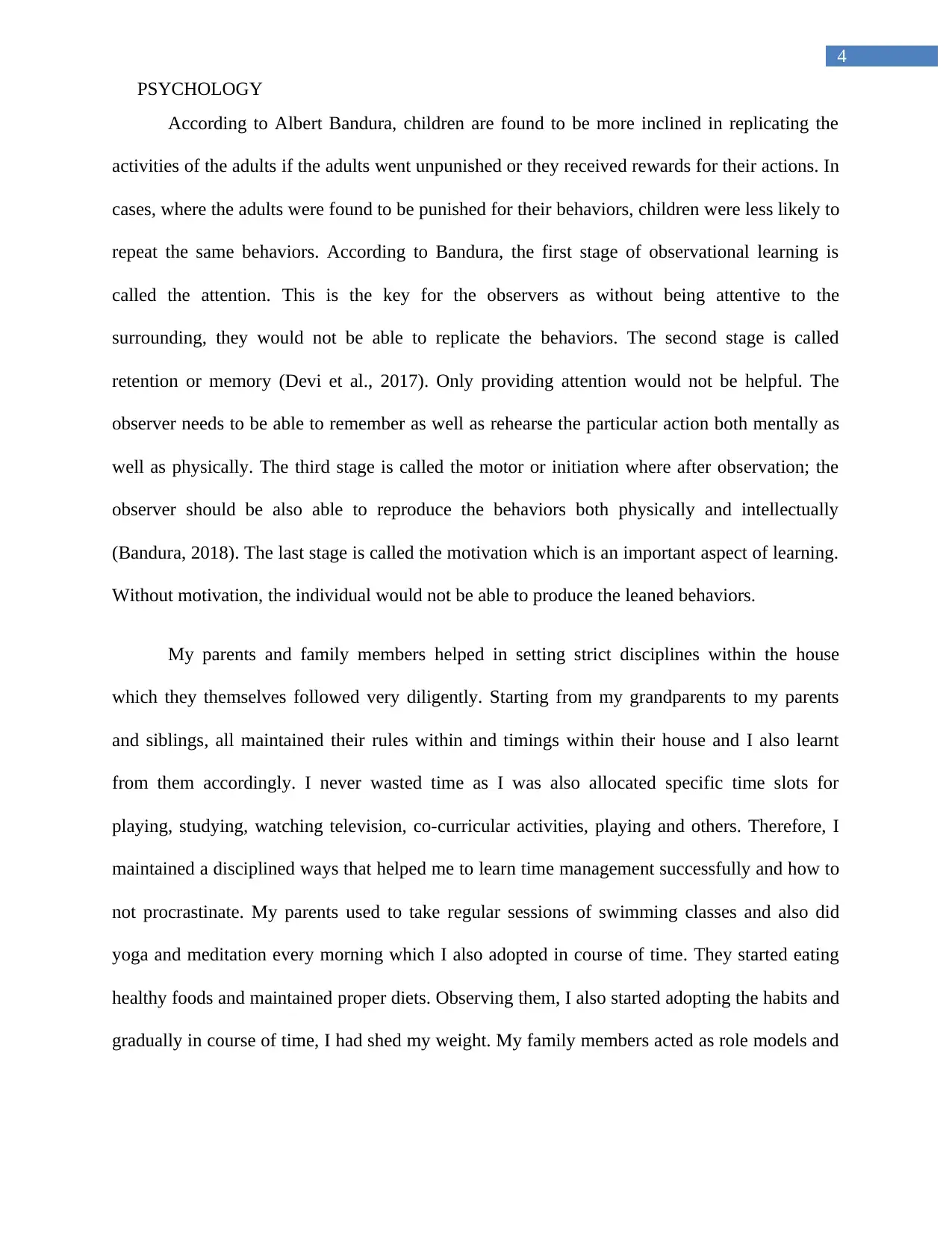
4
PSYCHOLOGY
According to Albert Bandura, children are found to be more inclined in replicating the
activities of the adults if the adults went unpunished or they received rewards for their actions. In
cases, where the adults were found to be punished for their behaviors, children were less likely to
repeat the same behaviors. According to Bandura, the first stage of observational learning is
called the attention. This is the key for the observers as without being attentive to the
surrounding, they would not be able to replicate the behaviors. The second stage is called
retention or memory (Devi et al., 2017). Only providing attention would not be helpful. The
observer needs to be able to remember as well as rehearse the particular action both mentally as
well as physically. The third stage is called the motor or initiation where after observation; the
observer should be also able to reproduce the behaviors both physically and intellectually
(Bandura, 2018). The last stage is called the motivation which is an important aspect of learning.
Without motivation, the individual would not be able to produce the leaned behaviors.
My parents and family members helped in setting strict disciplines within the house
which they themselves followed very diligently. Starting from my grandparents to my parents
and siblings, all maintained their rules within and timings within their house and I also learnt
from them accordingly. I never wasted time as I was also allocated specific time slots for
playing, studying, watching television, co-curricular activities, playing and others. Therefore, I
maintained a disciplined ways that helped me to learn time management successfully and how to
not procrastinate. My parents used to take regular sessions of swimming classes and also did
yoga and meditation every morning which I also adopted in course of time. They started eating
healthy foods and maintained proper diets. Observing them, I also started adopting the habits and
gradually in course of time, I had shed my weight. My family members acted as role models and
PSYCHOLOGY
According to Albert Bandura, children are found to be more inclined in replicating the
activities of the adults if the adults went unpunished or they received rewards for their actions. In
cases, where the adults were found to be punished for their behaviors, children were less likely to
repeat the same behaviors. According to Bandura, the first stage of observational learning is
called the attention. This is the key for the observers as without being attentive to the
surrounding, they would not be able to replicate the behaviors. The second stage is called
retention or memory (Devi et al., 2017). Only providing attention would not be helpful. The
observer needs to be able to remember as well as rehearse the particular action both mentally as
well as physically. The third stage is called the motor or initiation where after observation; the
observer should be also able to reproduce the behaviors both physically and intellectually
(Bandura, 2018). The last stage is called the motivation which is an important aspect of learning.
Without motivation, the individual would not be able to produce the leaned behaviors.
My parents and family members helped in setting strict disciplines within the house
which they themselves followed very diligently. Starting from my grandparents to my parents
and siblings, all maintained their rules within and timings within their house and I also learnt
from them accordingly. I never wasted time as I was also allocated specific time slots for
playing, studying, watching television, co-curricular activities, playing and others. Therefore, I
maintained a disciplined ways that helped me to learn time management successfully and how to
not procrastinate. My parents used to take regular sessions of swimming classes and also did
yoga and meditation every morning which I also adopted in course of time. They started eating
healthy foods and maintained proper diets. Observing them, I also started adopting the habits and
gradually in course of time, I had shed my weight. My family members acted as role models and
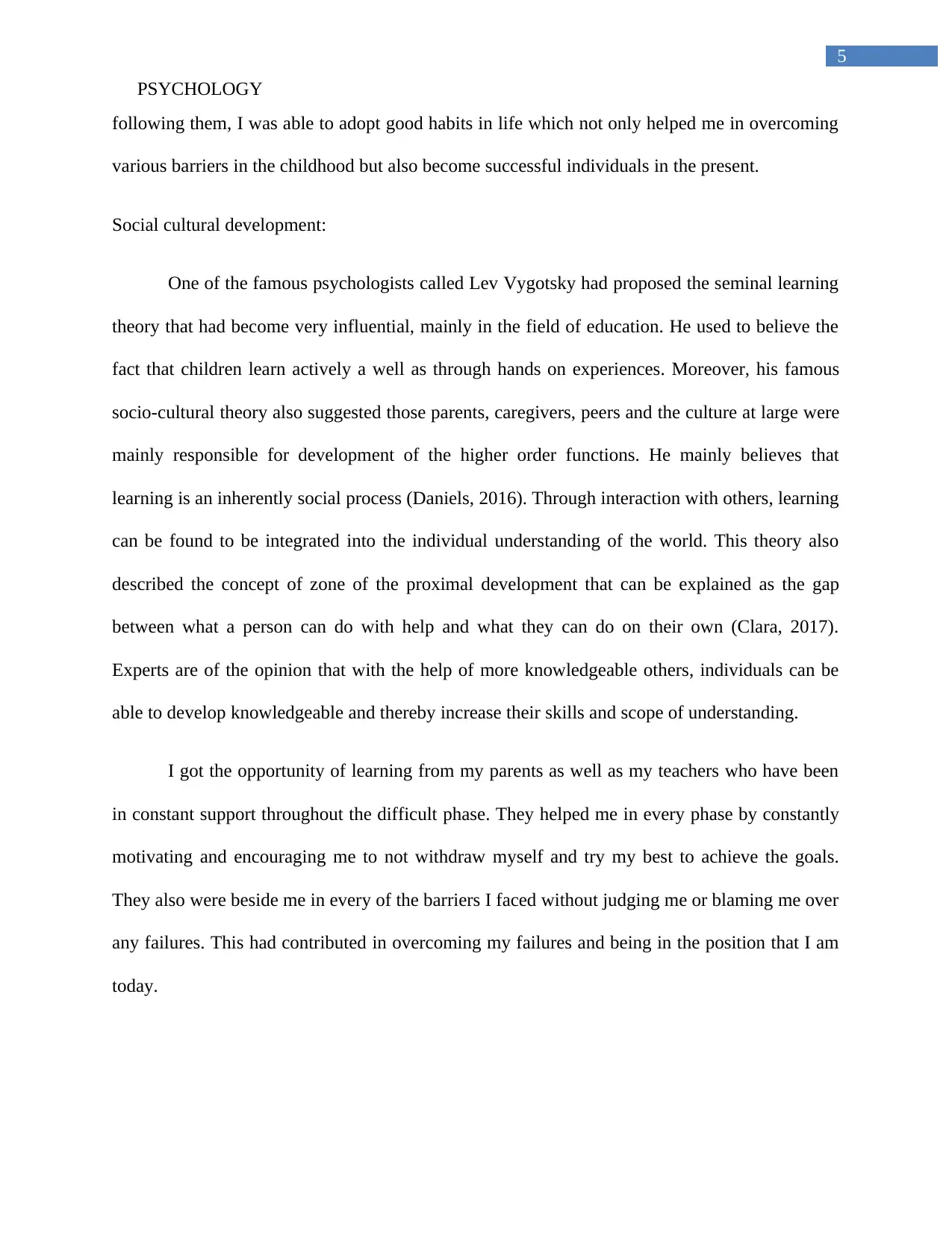
5
PSYCHOLOGY
following them, I was able to adopt good habits in life which not only helped me in overcoming
various barriers in the childhood but also become successful individuals in the present.
Social cultural development:
One of the famous psychologists called Lev Vygotsky had proposed the seminal learning
theory that had become very influential, mainly in the field of education. He used to believe the
fact that children learn actively a well as through hands on experiences. Moreover, his famous
socio-cultural theory also suggested those parents, caregivers, peers and the culture at large were
mainly responsible for development of the higher order functions. He mainly believes that
learning is an inherently social process (Daniels, 2016). Through interaction with others, learning
can be found to be integrated into the individual understanding of the world. This theory also
described the concept of zone of the proximal development that can be explained as the gap
between what a person can do with help and what they can do on their own (Clara, 2017).
Experts are of the opinion that with the help of more knowledgeable others, individuals can be
able to develop knowledgeable and thereby increase their skills and scope of understanding.
I got the opportunity of learning from my parents as well as my teachers who have been
in constant support throughout the difficult phase. They helped me in every phase by constantly
motivating and encouraging me to not withdraw myself and try my best to achieve the goals.
They also were beside me in every of the barriers I faced without judging me or blaming me over
any failures. This had contributed in overcoming my failures and being in the position that I am
today.
PSYCHOLOGY
following them, I was able to adopt good habits in life which not only helped me in overcoming
various barriers in the childhood but also become successful individuals in the present.
Social cultural development:
One of the famous psychologists called Lev Vygotsky had proposed the seminal learning
theory that had become very influential, mainly in the field of education. He used to believe the
fact that children learn actively a well as through hands on experiences. Moreover, his famous
socio-cultural theory also suggested those parents, caregivers, peers and the culture at large were
mainly responsible for development of the higher order functions. He mainly believes that
learning is an inherently social process (Daniels, 2016). Through interaction with others, learning
can be found to be integrated into the individual understanding of the world. This theory also
described the concept of zone of the proximal development that can be explained as the gap
between what a person can do with help and what they can do on their own (Clara, 2017).
Experts are of the opinion that with the help of more knowledgeable others, individuals can be
able to develop knowledgeable and thereby increase their skills and scope of understanding.
I got the opportunity of learning from my parents as well as my teachers who have been
in constant support throughout the difficult phase. They helped me in every phase by constantly
motivating and encouraging me to not withdraw myself and try my best to achieve the goals.
They also were beside me in every of the barriers I faced without judging me or blaming me over
any failures. This had contributed in overcoming my failures and being in the position that I am
today.
⊘ This is a preview!⊘
Do you want full access?
Subscribe today to unlock all pages.

Trusted by 1+ million students worldwide
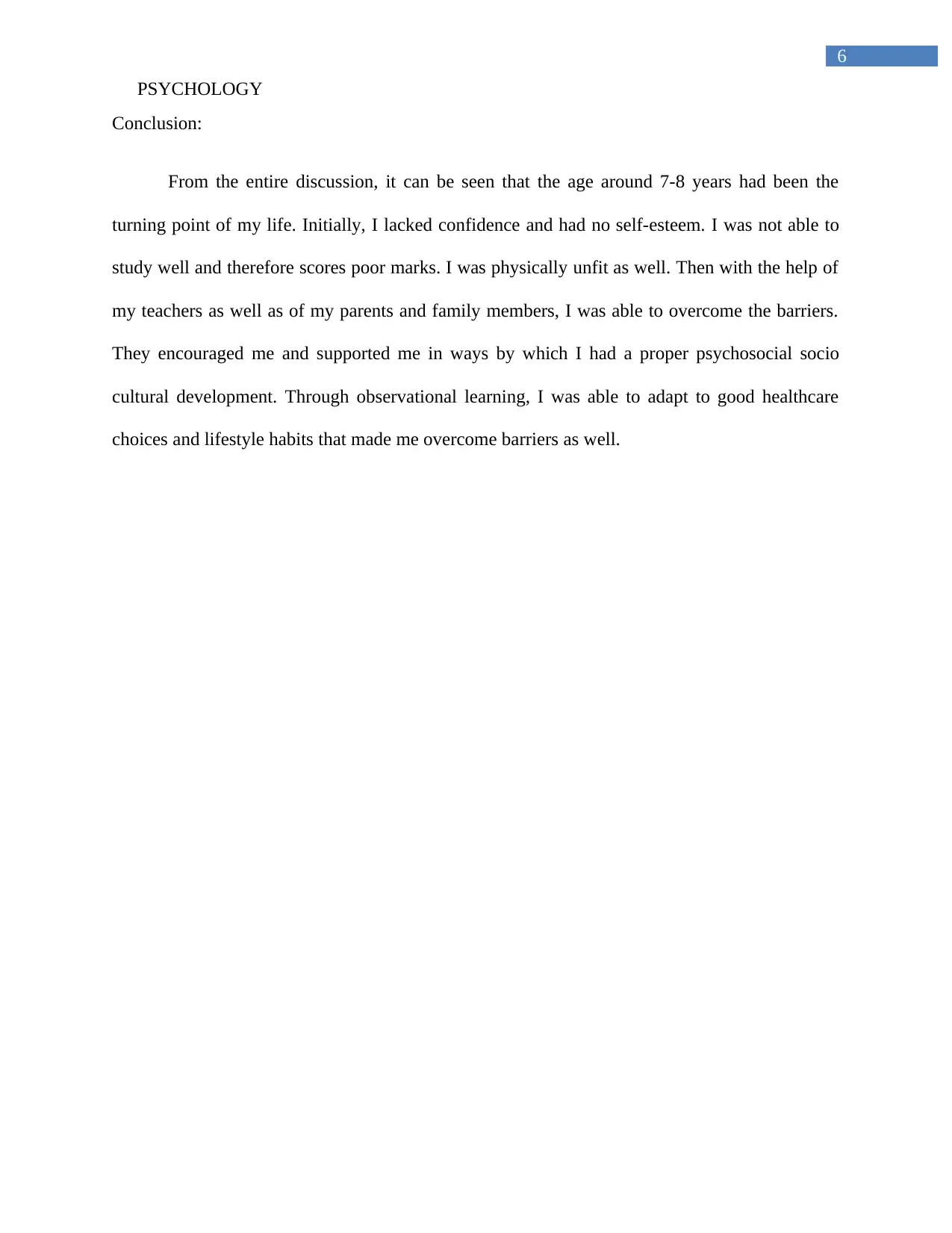
6
PSYCHOLOGY
Conclusion:
From the entire discussion, it can be seen that the age around 7-8 years had been the
turning point of my life. Initially, I lacked confidence and had no self-esteem. I was not able to
study well and therefore scores poor marks. I was physically unfit as well. Then with the help of
my teachers as well as of my parents and family members, I was able to overcome the barriers.
They encouraged me and supported me in ways by which I had a proper psychosocial socio
cultural development. Through observational learning, I was able to adapt to good healthcare
choices and lifestyle habits that made me overcome barriers as well.
PSYCHOLOGY
Conclusion:
From the entire discussion, it can be seen that the age around 7-8 years had been the
turning point of my life. Initially, I lacked confidence and had no self-esteem. I was not able to
study well and therefore scores poor marks. I was physically unfit as well. Then with the help of
my teachers as well as of my parents and family members, I was able to overcome the barriers.
They encouraged me and supported me in ways by which I had a proper psychosocial socio
cultural development. Through observational learning, I was able to adapt to good healthcare
choices and lifestyle habits that made me overcome barriers as well.
Paraphrase This Document
Need a fresh take? Get an instant paraphrase of this document with our AI Paraphraser
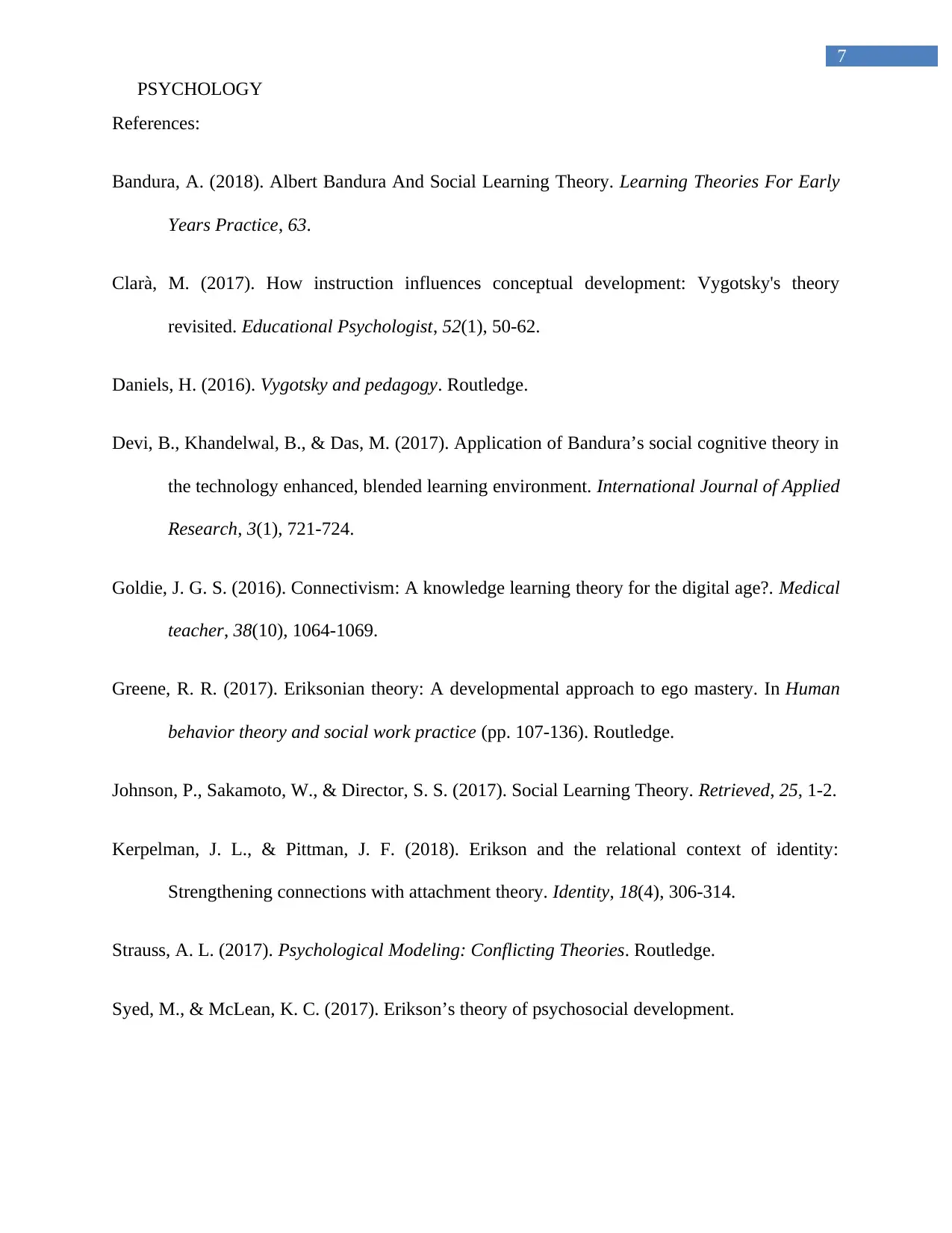
7
PSYCHOLOGY
References:
Bandura, A. (2018). Albert Bandura And Social Learning Theory. Learning Theories For Early
Years Practice, 63.
Clarà, M. (2017). How instruction influences conceptual development: Vygotsky's theory
revisited. Educational Psychologist, 52(1), 50-62.
Daniels, H. (2016). Vygotsky and pedagogy. Routledge.
Devi, B., Khandelwal, B., & Das, M. (2017). Application of Bandura’s social cognitive theory in
the technology enhanced, blended learning environment. International Journal of Applied
Research, 3(1), 721-724.
Goldie, J. G. S. (2016). Connectivism: A knowledge learning theory for the digital age?. Medical
teacher, 38(10), 1064-1069.
Greene, R. R. (2017). Eriksonian theory: A developmental approach to ego mastery. In Human
behavior theory and social work practice (pp. 107-136). Routledge.
Johnson, P., Sakamoto, W., & Director, S. S. (2017). Social Learning Theory. Retrieved, 25, 1-2.
Kerpelman, J. L., & Pittman, J. F. (2018). Erikson and the relational context of identity:
Strengthening connections with attachment theory. Identity, 18(4), 306-314.
Strauss, A. L. (2017). Psychological Modeling: Conflicting Theories. Routledge.
Syed, M., & McLean, K. C. (2017). Erikson’s theory of psychosocial development.
PSYCHOLOGY
References:
Bandura, A. (2018). Albert Bandura And Social Learning Theory. Learning Theories For Early
Years Practice, 63.
Clarà, M. (2017). How instruction influences conceptual development: Vygotsky's theory
revisited. Educational Psychologist, 52(1), 50-62.
Daniels, H. (2016). Vygotsky and pedagogy. Routledge.
Devi, B., Khandelwal, B., & Das, M. (2017). Application of Bandura’s social cognitive theory in
the technology enhanced, blended learning environment. International Journal of Applied
Research, 3(1), 721-724.
Goldie, J. G. S. (2016). Connectivism: A knowledge learning theory for the digital age?. Medical
teacher, 38(10), 1064-1069.
Greene, R. R. (2017). Eriksonian theory: A developmental approach to ego mastery. In Human
behavior theory and social work practice (pp. 107-136). Routledge.
Johnson, P., Sakamoto, W., & Director, S. S. (2017). Social Learning Theory. Retrieved, 25, 1-2.
Kerpelman, J. L., & Pittman, J. F. (2018). Erikson and the relational context of identity:
Strengthening connections with attachment theory. Identity, 18(4), 306-314.
Strauss, A. L. (2017). Psychological Modeling: Conflicting Theories. Routledge.
Syed, M., & McLean, K. C. (2017). Erikson’s theory of psychosocial development.
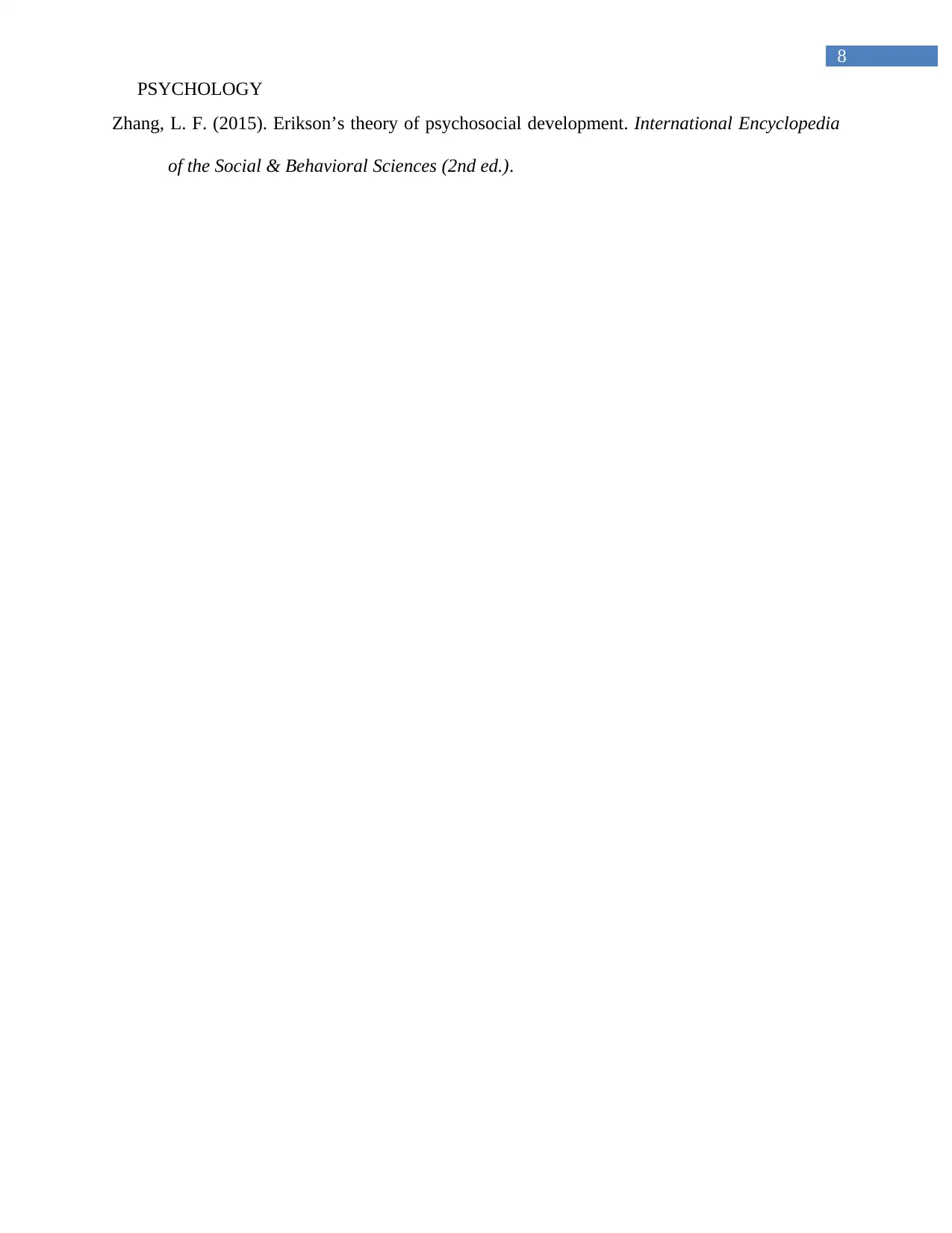
8
PSYCHOLOGY
Zhang, L. F. (2015). Erikson’s theory of psychosocial development. International Encyclopedia
of the Social & Behavioral Sciences (2nd ed.).
PSYCHOLOGY
Zhang, L. F. (2015). Erikson’s theory of psychosocial development. International Encyclopedia
of the Social & Behavioral Sciences (2nd ed.).
⊘ This is a preview!⊘
Do you want full access?
Subscribe today to unlock all pages.

Trusted by 1+ million students worldwide
1 out of 9
Related Documents
Your All-in-One AI-Powered Toolkit for Academic Success.
+13062052269
info@desklib.com
Available 24*7 on WhatsApp / Email
![[object Object]](/_next/static/media/star-bottom.7253800d.svg)
Unlock your academic potential
Copyright © 2020–2026 A2Z Services. All Rights Reserved. Developed and managed by ZUCOL.





